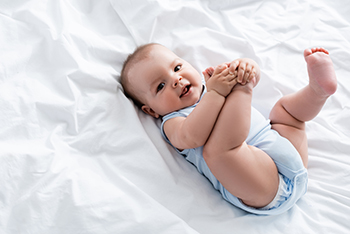

Pregnant parents look forward to counting their baby's 10 perfect fingers and toes. Anything else is rare, but it does happen. Fairly common is seeing a newborn baby’s feet point in opposite directions. This can be due to the baby being squished in the small womb. Other times it can result from the child’s development or as part of a genetic condition. The two most commonly seen foot deformities in newborns are metatarsus adductus and calcaneovalgus. Both involve the baby’s foot positioning and how they were molded inside the womb. These conditions usually improve without treatment and do not cause long-term problems. However, there are more serious congenital disorders of the feet that do require treatment. If you know your child will be born with any kind of foot deformity or discover this at birth, see a podiatrist as soon as possible to have your baby’s feet examined and to obtain suggestions or treatment needed.
Congenital foot problems require immediate attention to avoid future complications. If you have any concerns, contact Dr. Edward D. Hutson of Easton, PA. . Our doctor can provide the care you need to keep you pain-free and on your feet.
Congenital foot problems are deformities affecting the feet, toes, and/or ankles that children are born with. Some of these conditions have a genetic cause while others just happen. Some specific foot ailments that children may be born with include clubfeet, polydactyly/macrodactyly, and cleft foot. There are several other foot anomalies that can occur congenitally. What all of these conditions have in common is that a child may experience difficulty walking or performing everyday activities, as well as trouble finding footwear that fits their foot deformity. Some of these conditions are more serious than others. Consulting with a podiatrist as early as possible will help in properly diagnosing a child’s foot condition while getting the necessary treatment underway.
What are Causes of Congenital Foot Problem?
A congenital foot problem is one that happens to a child at birth. These conditions can be caused by a genetic predisposition, developmental or positional abnormalities during gestation, or with no known cause.
What are Symptoms of Congenital Foot Problems?
Symptoms vary by the congenital condition. Symptoms may consist of the following:
Treatment and Prevention
While there is nothing one can do to prevent congenital foot problems, raising awareness and receiving neonatal screenings are important. Early detection by taking your child to a podiatrist leads to the best outcome possible.
If you have any questions please feel free to contact our offices located in Easton, and Northampton, PA . We offer the newest diagnostic tools and technology to treat your foot and ankle needs.